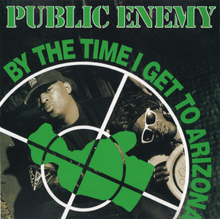By the Time I Get to Arizona (1991)
By the Time I Get to Arizona is a song by American hip hop group Public Enemy from their 1991 album Apocalypse 91... The Enemy Strikes Black. The song was written by frontman Chuck D in protest of the state of Arizona, where governor Evan Mecham had canceled Martin Luther King Jr. Day and the people voted against its reintroduction.[1]
It was released as a B-side to the single "Shut 'Em Down" in January 1992, but had its own music video. The video was controversial for its depiction of black paramilitaries assassinating Arizona politicians in revenge for King, who was non-violent. Some black activists and King's widow Coretta Scott King condemned the themes of the video. Chuck D and Public Enemy's spokesman Harry Allen defended the video as a fictional revenge for King's assassination.[2]
Contents
Key Lyrics
Twenty-thousand niggy-niggy brothers in the corner
Of the cell block, but they come from California
Population is none in the desert and sun
With a gun cracker runnin' things under his thumb
Starin' hard at the postcards, isn't it odd and unique
Seein' people smile wild in the heat?
A hundred-twenty degree, 'cause I want to be free
What's a smilin' face when the whole state's racist?
Background
Public Enemy frontman Chuck D wrote the song in protest at the state of Arizona, where Governor Evan Mecham had canceled Martin Luther King Jr. Day and the people of the state voted against a proposition to reintroduce it. Backlash to this decision included the NFL moving Super Bowl XXVII to California, losing around $100 million in revenue for Arizona.[3]
In the lyrics of the song, Chuck D says "neither party is mine, not the jackass or the elephant", indicating that he and the black community will not challenge Arizona by voting for the Democratic or Republican parties represented by those mascots.[4]
Reception
Reference
- ↑ By the Time I Get to Arizona. Wikipedia. Retrieved February 1, 2021.
- ↑ "Public Enemy's Lasting Tribute To Martin Luther King, Jr". 4 April 2018. The Source. Retrieved February 1, 2021.
- ↑ Evan Serpick. "Public Enemy Look Back at 20 Years of 'By the Time I Get to Arizona'". 10 November 2011. Spin. Retrieved February 1, 2021.
- ↑ Karyn Charles Rybacki and Donald Jay Rybacki. "Cultural approaches to the rhetorical analysis of selected music videos". 1999. Trans: Revista Intercultural de Música. Retrieved February 1, 2021.
